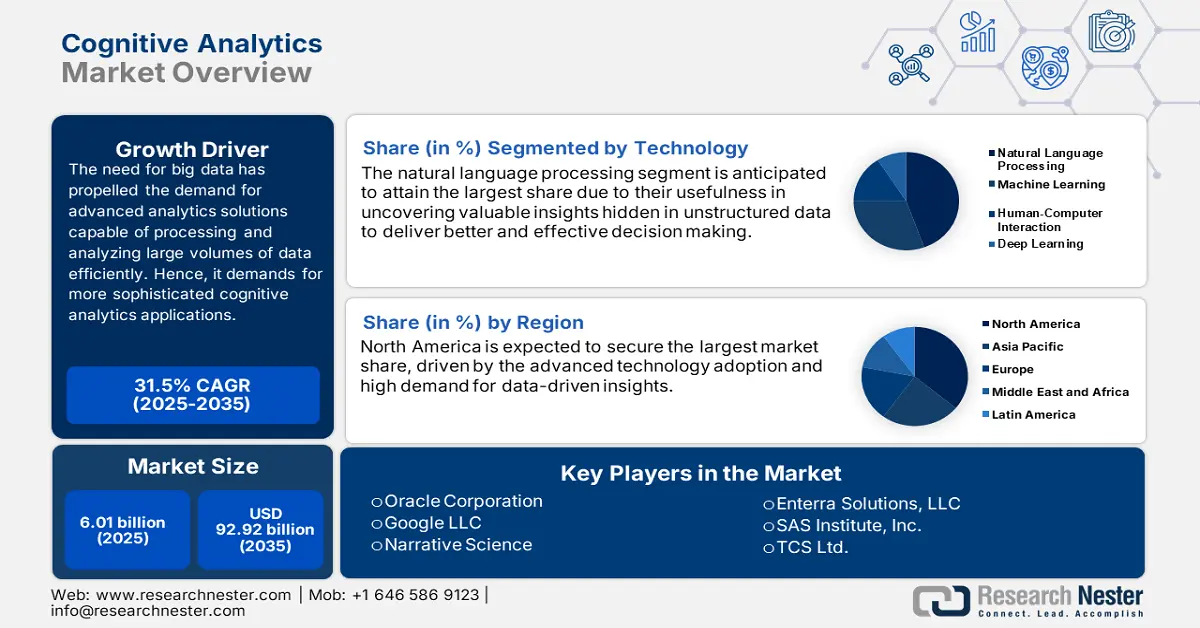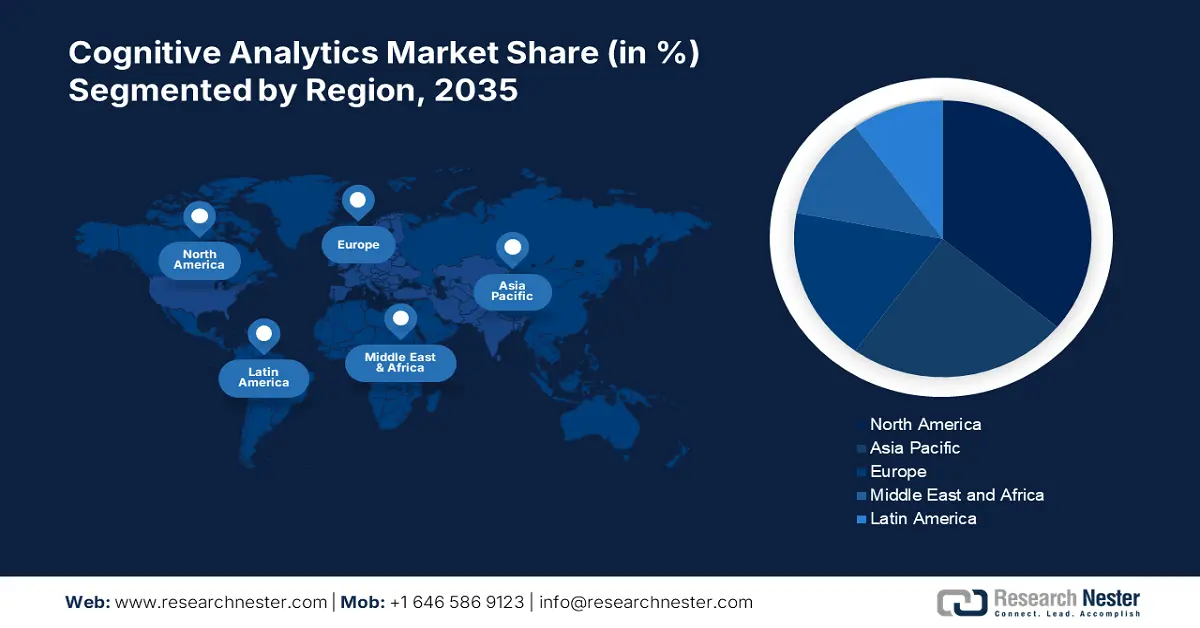Cognitive Analytics Market Outlook:
Cognitive Analytics Market size was over USD 6.01 billion in 2025 and is projected to reach USD 92.92 billion by 2035, growing at around 31.5% CAGR during the forecast period i.e., between 2026-2035. In the year 2026, the industry size of cognitive analytics is evaluated at USD 7.71 billion.

It is anticipated that the expansion of cognitive computing solutions will be supported by the increasing adoption of integrated cloud platforms and artificial intelligence. By 2030, the sector for AI is predicted to expand twentyfold. By 2025, 97 million workers will be there in the AI industry.
In addition, global demand for cognitive analytics is rising at a rapid rate, mainly because predictive analytics is becoming more and more advanced and there is an ongoing desire to improve workplace performance. By offering real-time responses together with the capability to search through vast volumes of data and information, understand context, and determine the most likely response, a cognitive solution system can provide a firm with a competitive edge over its rivals.
Key Cognitive Analytics Market Insights Summary:
Regional Highlights:
- North America cognitive analytics market will hold more than 30% share, driven by rising AI technology investments in the United States, fostering the development of advanced cognitive analytics solutions, forecast period 2026–2035.
- Europe market will capture a 27% share, fueled by increasing adoption of AI and machine learning, supported by a strong base of AI start-ups in European nations, forecast period 2026–2035.
Segment Insights:
- The natural language processing segment in the cognitive analytics market is projected to witness robust growth through 2035, driven by the rise of NLP in IT infrastructure and smart assistants.
Key Growth Trends:
- Increasing SME spending on digital tools
- Prioritize hyper-personalization to accelerate market expansion
Major Challenges:
- Increasing SME spending on digital tools
- Prioritize hyper-personalization to accelerate market expansion
Key Players: Oracle Corporation, Google LLC, Microsoft Corporation, Cisco Systems Inc., Amazon Web Services, Narrative Science, Nuance Communications, Inc., Enterra Solutions, LLC, SAS Institute Inc., Tata Consultancy Services Ltd.
Global Cognitive Analytics Market Forecast and Regional Outlook:
Market Size & Growth Projections:
- 2025 Market Size: USD 6.01 billion
- 2026 Market Size: USD 7.71 billion
- Projected Market Size: USD 92.92 billion by 2035
- Growth Forecasts: 31.5% CAGR (2026-2035)
Key Regional Dynamics:
- Largest Region: North America (30% Share by 2035)
- Fastest Growing Region: Asia Pacific
- Dominating Countries: United States, China, Germany, Japan, United Kingdom
- Emerging Countries: China, India, Brazil, Mexico, Singapore
Last updated on : 16 September, 2025
Cognitive Analytics Market Growth Drivers and Challenges:
Growth Drivers
- Increasing SME spending on digital tools - Small and medium-sized businesses are heavily investing in cognitive analytics solutions to improve their decision-making processes in preparation for the digital transformation. Through the provision of real-time insights, it assists small firms in addressing operational difficulties. These businesses also struggle to find funding and hire qualified employees. This makes integrating cutting-edge technical solutions crucial for these kinds of enterprises.
Parallel to this, there is an increase in digitalization and client participation in online transactions. By employing sophisticated and perceptive analytical instruments, small and medium-sized enterprises (SMEs) can acquire knowledge about things like purchase patterns and bottlenecks. This can lead to consumer satisfaction and improve corporate tactics. Thus, it is projected that rising SMEs' investments in digital solutions will fuel the expansion of the cognitive analytics market.
- Prioritize hyper-personalization to accelerate market expansion - Businesses are concentrating on attracting new consumers and keeping hold of existing ones through a variety of tactics to increase sales. These tactics center on the individual experiences of the clients, and businesses pay close attention to the needs and shifting preferences of their clientele. The need for real-time insights-supporting cognitive analytics solutions that assist businesses in making better decisions has increased as a result.
Technology can assist in providing individualized marketing strategies since it leverages consumer purchasing trends. These technologies can assist firms in creating client targeting strategies by giving them access to social media data and current trend insights. Therefore, it is predicted that growing product adoption by customer-focused businesses will increase cognitive analytics market share.
- Growing need for insights driven by data- An encouraging market picture is being provided by the growing need for data-driven insights. A positive market outlook is also being provided by firms' growing understanding of the use of data in decision-making, efficiency gains, and competitive advantage. The need for sophisticated tools like cognitive computing to extract meaningful insights is being driven by the exponential growth of data from various sources, such as social media, Internet of Things (IoT) devices, and sensors. The most recent statistics available estimate that there are 15.14 billion IoT devices connected.
Challenges
- Safety & security issues limiting the market growth - For the tool to recognize the pattern and perform analysis, it required a large amount of data. It also makes use of innovative technology including artificial intelligence, machine learning, and natural language processing. It increases the possibility of security lapses and data breaches. Additionally, the growing number of laws, such as the General Data Protection Regulation which restricts how companies can use personal consumer data could act as an obstacle to the expansion of the cognitive analytics market.
- High price of solutions for cognitive analytics.
- Scarcity of highly qualified experts in the domains of artificial intelligence and cognitive analytics.
Cognitive Analytics Market Size and Forecast:
| Report Attribute | Details |
|---|---|
|
Base Year |
2025 |
|
Forecast Period |
2026-2035 |
|
CAGR |
31.5% |
|
Base Year Market Size (2025) |
USD 6.01 billion |
|
Forecast Year Market Size (2035) |
USD 92.92 billion |
|
Regional Scope |
|
Cognitive Analytics Market Segmentation:
Technology Segment Analysis
Based on technology, natural language processing segment in the cognitive analytics market is estimated to hold 40% of the revenue share during the forecast period. Consistent with current developments, NLP's rise has contributed to the global advancement of cognitive technology in IT infrastructure. Furthermore, the growing popularity of predictive text and smart assistants like Alexa and Siri has expanded the reach of cognitive computing solutions.
The expanding use of chatbots and virtual assistants across a range of businesses, together with the rising demand for big data, machine learning, and sophisticated analytics technologies, are the main factors driving this expansion. A key element of cognitive computing is natural language processing (NLP), which enables machines to comprehend and use human language. Speech and text can be analyzed and interpreted by NLP technology, which can also produce replies that are human-understandable.
Applications of natural language processing (NLP), such as chatbots, virtual assistants, and voice-activated gadgets, are becoming more and more common in several areas, including healthcare, retail, and finance. Approximately 62% of clients would prefer to use a customer support bot rather than wait for a human agent to answer their questions. As a result, the cognitive analytics market is projected to expand in this segment.
Component Segment Analysis
Based on components, the tools segment in the cognitive analytics market is projected to hold the second-largest revenue share during the projected period. The demand for cognitive analytics solutions is growing significantly due to the need for autonomy and control over analytics processes. In data analysis, the aim of businesses is self-reliance, which makes them independently create, test, and execute various solutions. This control assures privacy, flexibility, and the potential to change analytics to meet required needs.
By using advanced technologies, businesses can make data-driven decisions instantaneously without waiting for outside advice, resulting in faster, more effective, and more individualized insights. This drive for autonomy fuels the cognitive analytics market's expansion, giving companies the flexibility to use data analytics for their own needs.
Our in-depth analysis of the global cognitive analytics market includes the following segments:
|
Component |
|
|
Deployment |
|
|
Technology |
|
|
Enterprise Size |
|
|
Application |
|
|
End User |
|

Vishnu Nair
Head - Global Business DevelopmentCustomize this report to your requirements — connect with our consultant for personalized insights and options.
Cognitive Analytics Market Regional Analysis:
North American Market Insights
The cognitive analytics market in North America is predicted to hold the largest market share 30% during the forecast period. The primary factor that drives the market size is growth in AI technology investments in the United States. American businesses started making notable investments in AI research, development, and application, which resulted in the development of cutting-edge cognitive analytics solutions.
These initiatives foster creativity, improve the functionality of cognitive analytics tools, and promote their use in different sectors. As a result, the cognitive analytics market in North America is still expanding significantly mainly driven by continuous investments in AI technology. North America is expected to be a prominent regional artificial intelligence (AI) market by 2022, with an estimated value of USD 24.9 billion.
Europe Market Insights
The cognitive analytics market in Europe is considered to record a noteworthy market share of over 27% throughout the projection period. The digital divide will be closed by the growing use of technologies like artificial intelligence and machine learning. According to the top analytics research on the European AI frontier, 25% of AI start-ups are located in European nations, which is expected to propel market progress in that region.
The growing awareness of the benefits linked with implementing cognitive training sessions, games, and assessments in schools and other colleges is a growth-driving factor that will create an opportunity for the growth of the cognitive analytics market.

Cognitive Analytics Market Players:
- Oracle Corporation
- Company Overview
- Business Strategy
- Key Product Offerings
- Financial Performance
- Key Performance Indicators
- Risk Analysis
- Recent Development
- Regional Presence
- SWOT Analysis
- Google LLC
- Microsoft Corporation
- Cisco Systems Inc.
- Amazon Web Services
- Narrative Science
- Nuance Communications, Inc.
- Enterra Solutions, LLC
- SAS Institute Inc.
- Tata Consultancy Services Ltd.
Recent Developments
- Tata Consultancy Services Ltd. announced the release of TCS Cognitive Plant Operations Adviser for the Microsoft Azure Private Mobile Edge Computing (PMEC) platform, Tata Consultancy Services Ltd. This launch was aimed to convert production by employing AI and machine learning to make it more intelligent and resilient.
- Enterra Solutions, LLC has established a new office in Cambridge. After the opening of its office in Kendall Square, the company will be able to additionally grow its advanced artificial intelligence offerings that serve as a bond between governmental agencies and the commercial sector. Moreover, strengthens its position as a global hub for technology innovation.
- Report ID: 5665
- Published Date: Sep 16, 2025
- Report Format: PDF, PPT
- Explore a preview of key market trends and insights
- Review sample data tables and segment breakdowns
- Experience the quality of our visual data representations
- Evaluate our report structure and research methodology
- Get a glimpse of competitive landscape analysis
- Understand how regional forecasts are presented
- Assess the depth of company profiling and benchmarking
- Preview how actionable insights can support your strategy
Explore real data and analysis
Frequently Asked Questions (FAQ)
Cognitive Analytics Market Report Scope
Free Sample includes current and historical market size, growth trends, regional charts & tables, company profiles, segment-wise forecasts, and more.
Connect with our Expert
Copyright @ 2026 Research Nester. All Rights Reserved.




